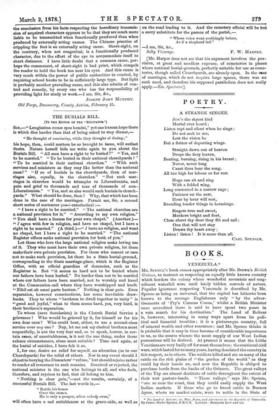THE BURIALS BILL.
[TO THE EDITOR OF THE "SPECTATOR."
Longissima ecenw apes homini," yet one human hope there is which dies harder than that of being asked to Stay dinner,- " He thought of convincing, while they thought of dining; " -his hope, then, could matters be so brought to issue, will outlast -theirs. Nature herself bids me write again to you about the Burials Bill. " All men have a right to be buried ?" " Yes, and to be married." " To be buried in their national churchyards ? " 4' To be married in their national churches." " With such services and ministers as they may like better than the national Imes? " " If so of burials in the churchyards, then of mar- riages also, equally, in the churches." " But such mar- riages in churches would be triumphs to Liberationists, and pain and grief to thousands and tens of thousands of non- Liberationists." "Yes, and so also would such burials in church- yards." What should be done, then ? Why, that which has been -done in the case of the marriages. Permit me, Sir, a second short series of sentences quasi-catechetical :- " I have a right to be married." " The national churches are a national provision for it." " According to my own religion." r'' You shall have a license for your own chapel." (Another.)- ' I agree with few in religion, and have no chapel, but I have a Tight to be married." (A third.)—" 1 have no religion, and want no chapel, but I have a right to be married." "The national Register offices make national provision for both of you."
Let those who love the large national religion make loving use -of it. They who must have their own private religion, let them make their own private provision. For those who cannot or care not to make such provision, let there be a State burial-ground, -corresponding to the State marriage-place, which is the Register Office, with an official guardian of decencies, such as the Registrar is. But "it seems so hard not to be buried where our fathers have been buried." No harder than not to be married where our fathers have been married, not to worship and kneel at the Communion-rail where they have worshipped and knelt. 4' Nihil est ab omni parte beatum." Nothing is clear gain. Even separation, however conscientious, has some inevitable draw- backs. They to whom "brethren to dwell together in unity" is "good and joyful," what to them seems hard, yes, very hard, is their brethren's separation.
To whom (save Secularists) is the Church Burial Service a grievance ? Who would be grieved by it, for himself or for his own dear ones ? Who could bear, either, to use a second-class service over any one? Nay, let me ask my clerical brethren most respectfully, is not the very fear and, so to speak, horror, in cer- tain cases, of unsuitableness, is it not the one thing, under those solemn circumstances, alone most suitable? Time and again, at the barial of suicides, I have felt it so.
I, for one, desire no relief for myself, no alteration (as to our Churchyards) for the relief of others. Nor in any event should I object to burying the Dissenters' " refuse," but should rejoice rather to render all reverence to such remains. Received or rejected, the national minister is the one who belongs to all, and who feels, therefore, and rejoices to feel, that all belong to him.
"Nothing is clear gain,"—not the results, certainly, of a successful Burials Bill. The last words in,— "Rattle his bones
Over the stones.
He is only a pauper, whom nobody owns,"
will often have a sad suitableness at the grave-side, as well as
on the road leading to it. And the cemetery official will be but a sorry substitute for the parson of the parish,— "Whose voice went soothingly before, Aa if a shepherd led." ain, Sir, &c., [Mr. Harper does not see that his argument involves the pro- vision, at great and needless expense, of cemeteries in places where national burial-grounds, perfectly suitable for use as ceme- teries, though called Churchyards, are already open. In the case of marriages, which do not require large spaces, there was no such need, and therefore his supposed parallelism does not really apply.—En. Spectator].


































 Previous page
Previous page